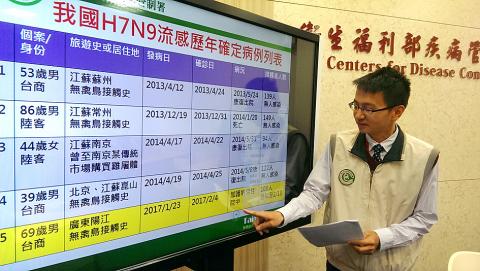The Centers for Disease Control (CDC) yesterday confirmed this year’s first case of H7N9 avian influenza in a human — a 69-year-old man who returned from China last month.
CDC Deputy Director-General Philip Lo (羅一鈞) said the man went to Yangjiang City in China’s Guangdong Province in September last year and worked there until the Lunar New Year holiday last month.
“The man said he developed a fever and respiratory symptoms on Jan. 23, before boarding a plane from Macau to Kaohsiung for the holiday,” Lo said. “He is Taiwanese and a resident of Kaohsiung.”

Photo: Wu Liang-yi, Taipei Times
He said the man arrived in Taiwan on Jan. 25 and personnel from the CDC quarantine station at Kaohsiung International Airport detected his fever and suggested that he seek medical attention at a hospital.
A hospital diagnosed his condition as a suspected case of type A (H3N2) influenza, but after test results returned negative, the man was given antiviral medicine used to treat flu symptoms and was instructed to rest, Lo said.
However, the man’s fever persisted, and he started coughing up phlegm and having difficulty breathing on Sunday last week, and was hospitalized with a suspected case of pneumonia at an intensive care unit on Wednesday, Lo said, adding that the patient’s case was confirmed as an H7N9 avian influenza infection after the CDC examined a specimen sent by the hospital.
“H7N9 avian influenza is usually transmitted from birds to humans and its early symptoms are similar to those of flu, but the patient’s condition rapidly worsens after a week, developing into a serious case of pneumonia, with a mortality rate of about 30 to 40 percent,” he said.
The patient is still in the intensive care unit, Lo said, adding that an investigation found that two of his colleagues in China had upper respiratory symptoms, but the symptoms subsided after they received medical treatment.
The man’s two relatives showed no avian influenza symptoms, Lo said, adding that the CDC will follow up on the condition of 108 people who had come into contact with the man recently.
The CDC said that 261 cases of H7N9 avian influenza infection in humans have been reported in China since October last year.
It urged the public to exercise caution and avoid direct exposure to poultry when traveling to China, as that nation is at the peak of its flu season.

Tropical Storm Gaemi strengthened into a typhoon at 2pm yesterday, and could make landfall in Yilan County tomorrow, the Central Weather Administration (CWA) said yesterday. The agency was scheduled to issue a sea warning at 11:30pm yesterday, and could issue a land warning later today. Gaemi was moving north-northwest at 4kph, carrying maximum sustained winds near its center of up to 118.8kph and gusts of 154.8kph. The circumference is forecast to reach eastern Taiwan tomorrow morning, with the center making landfall in Yilan County later that night before departing from the north coast, CWA weather forecaster Kuan Shin-ping (官欣平) said yesterday. Uncertainty remains and

SEA WARNING LIKELY: The storm, named Gaemi, could become a moderate typhoon on Wednesday or Thursday, with the Taipei City Government preparing for flooding A tropical depression east of the Philippines developed into a tropical storm named Gaemi at 2pm yesterday, and was moving toward eastern Taiwan, the Central Weather Administration (CWA) said. Gaemi could begin to affect Taiwan proper on Tuesday, lasting until Friday, and could develop into a moderate typhoon on Wednesday or Thursday, it said. A sea warning for Gaemi could be issued as early as Tuesday morning, it added. Gaemi, the third tropical storm in the Pacific Ocean this typhoon season, is projected to begin moving northwest today, and be closest to Taiwan on Wednesday or Thursday, the agency said. Today, there would likely

DISRUPTIONS: The high-speed rail is to operate as normal, while several airlines either canceled flights or announced early departures or late arrivals Schools and offices in 15 cities and counties are to be closed today due to Typhoon Gaemi, local governments announced last night. The 15 are: Taipei, New Taipei City, Taoyuan, Tainan, Keelung, Hsinchu and Kaohsiung, as well as Yilan, Hualien, Hsinchu, Miaoli, Chiayi, Pingtung, Penghu and Lienchiang counties. People should brace for torrential rainfall brought by the storm, with its center forecast to make landfall on the east coast between tonight and tomorrow morning, the Central Weather Administration (CWA) said. The agency issued a sea warning for the typhoon at 11:30pm on Monday, followed by a land warning at 11:30am yesterday. As of

CASUALTY: A 70-year-old woman was killed by a falling tree in Kaohsiung as the premier warned all government agencies to remain on high alert for the next 24 hours Schools and offices nationwide are to be closed for a second day today as Typhoon Gaemi crosses over the nation, bringing torrential rain and whipping winds. Gaemi was forecast to make landfall late last night. From Tuesday night, its outer band brought substantial rainfall and strong winds to the nation. As of 6:15pm last night, the typhoon’s center was 20km southeast of Hualien County, Central Weather Administration (CWA) data showed. It was moving at 19kph and had a radius of 250km. As of 3pm yesterday, one woman had died, while 58 people were injured, the Central Emergency Operation Center said. The 70-year-old